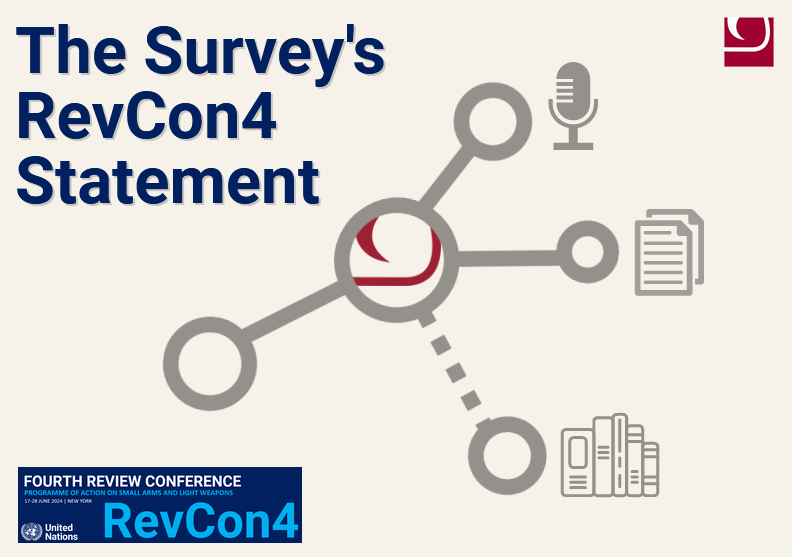
NEW: Small Arms Survey statement at RevCon4
The following statement was presented to the President and all attending delegations of the Fourth Review Conference of the Programme of Action on Small Arms and Light Weapons on Thursday, 20th June 2024:
The latest figures from our Global Violent Deaths database indicate that in 2021, over half a million people died violently, of which 260,000 were killed with a firearm. Early indicators suggest that the situation in subsequent years has worsened. Moreover, our recent work in the Caribbean indicates that the average cost of treating a single gunshot wound can be as high as eleven times the annual per capita spending on health. This data underlines the link between armed violence and development, as well as the fact that in many regions the illicit proliferation of small arms and light weapons is a public health, security as well as an arms control issue.
As the Small Arms Survey celebrates its 25th year, we remain committed to supporting the work of the POA, ITI and their implementation. We see the following fives issues as important for RevCon4:
- Ensuring that efforts to address the illicit trade in small arms look at both supply and demand factors; unless we address why people are trying to acquire illicit weapons, efforts to address illicit supply routes will have a limited impact.
- Supporting inclusive national strategies to implement the POA and ITI and ensuring that they are coherent with wider development strategies- The Survey's experience in supporting national authorities on small arms control in West Africa indicates that inclusive National Action Plans are effective tools for connecting small arms control efforts to national development frameworks, fostering national ownership and support interagency collaboration.
- Ensuring the inclusion of provisions on gender-responsive small arms control. Armed violence is a gendered phenomenon. Developing solutions requires strengthening efforts to collect gender-disaggregated data to measure the differential impact of small arms; incorporating gender perspectives in policies and programmes; and supporting the meaningful participation of diverse groups of women and men in all aspects of small arms control.
- Leveraging regional roadmaps to support national implementation through exchanges of information and coordinated responses, in partnership with international organizations such as Interpol and the World Customs Organization. Illicit small arms proliferation is a transnational challenge. The collection of region-specific baseline data and analysis is essential, as we are witnessing through our cooperation with CARICOM IMPACS and other leading regional agencies in support of the Caribbean Firearms Roadmap.
- Recent research and seizure data has shown the growing significance of privately made and other non-industrial small arms. For example 14% of recent seizures in Quebec are 3-D printed firearms, while in the Netherlands 40% of seizures are converted or modified firearms. This phenomenon affect all regions. This underlines the need for the POA to engage on these issues, if it is to remain relevant, it will therefore be crucial that the proposed OETEG works to identify and address both ongoing trends and new developments in small arms and light weapons manufacturing, technology and design that thwart the effective implementation of the PoA and ITI.
We are looking forward to fruitful exchanges on these topics at RevCon4 and remain committed to supporting the chair, member states and other NGOs in reaching a satisfactory outcome.